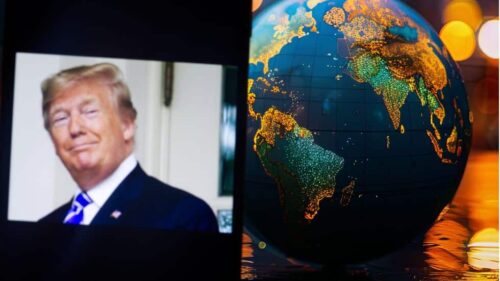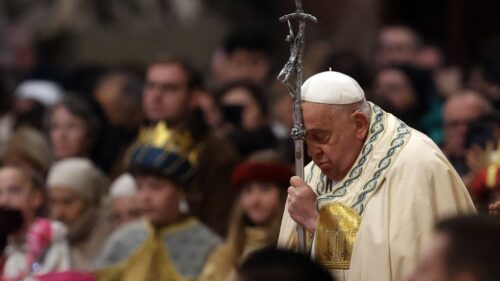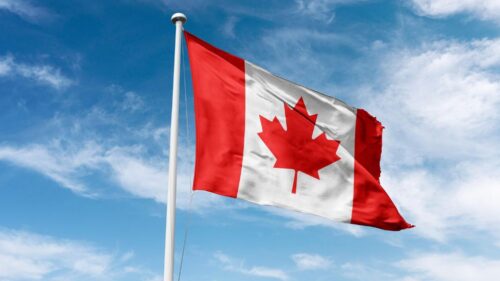The world now awaits the iconic puff of white smoke indicating the election of an individual who may be regarded as holding the unique remaining position of power with a claim to exercising a form of universal moral authority. Whether one accepts that authority or not, we cannot avoid sensing that the authority of every other institutional leader on Earth appears to focus exclusively on something very different from moral logic, if not clearly at odds with it.
The problem today is that moral authority doesn’t carry much weight in a world motivated by financial success and celebrity at the individual level and national security at the collective level. Moral authority, at least in the Western world, persists only amorphously in each individual’s heart — which means nowhere in the shared landscape — and officially in each nation’s laws. Moral standards exist in the form of reigning fashions. Tradition quotes Winston Churchill as the source for Stalin’s dismissive question: “How many divisions has the pope?”
So why are so many people willing to put up hard-earned cash to bet on the eventual winner in the race among papabiles? It isn’t just practicing Catholics who feel concerned by the conclave’s decision. An article by Rose Morelli on the website LBC informs us that “betting houses are cashing in on the opportunity” as “gamblers’ interest in the future papal rivals even Formula 1 and the Europa League on betting sites.”
And just to reassure us that this isn’t a modern vice associated with late-stage capitalism and its culture of financialized speculation, the article claims that the tradition of betting on the conclave’s decision dates back to 1503. As two popes were elected that year — the unfortunate Pius III died 26 days after his election, some say by poisoning — Morelli doesn’t provide sources to determine which of the two elections got Renaissance bookmakers excited enough to post their odds.
Posterity retains two major associations with Julius II, who lost the first but won the second election in 1503. It was Julius whose idea of commissioning the work to Michelangelo made it possible for today’s visitors to the Vatican to marvel at the Sistine Chapel’s ceiling. Perhaps more significantly, Julius, whom his contemporaries called “the Warrior Pope,” made a major contribution to Italy’s and Europe’s political instability over the subsequent century. His style of papacy transformed the Vatican into a European military empire Stalin might have respected. It helped create the conditions that would eventually lead, four years after the pope’s death in 1513, to Martin Luther’s open revolt against the Vatican’s militarized empire. The pope’s political adventurism set the stage for the humiliating disaster known as the Sack of Rome in 1527.
Pope Francis, whose successor will soon be elected, provided a stark contrast with the popes of half a millennium ago, such as Julius or his predecessor, Alexander VI, the Borgia pope. Could a new “warrior pope” — for example, hailing from a nation committed to war — succeed a Holy Father who famously claimed that all wars are unjust?
USA Today features an article by John Bacon with the title, “Will we see the first-ever American pope? How USA’s image could come into play.” It expresses a secret hope regularly evoked in recent decades following the death of a reigning pontiff.
Today’s Weekly Devil’s Dictionary definition:
American pope:
A fantasized historical figure, who speaks Latin and maybe Italian as well as English, but probably not Spanish.
Contextual note
The same article contains this true assertion: “Francis made history as the first pope from Latin America.” A totally logical visitor from Mars — even after colonization by Elon Musk — who happened upon this article would probably struggle with the idea that a “pope from South America” might be succeeded by a “first-ever American pope.” Does “first-ever” mean “second” in English? If so, that might make some sense.
Just asking the question in the title of the article appears to indicate the logical answer to the question. The reason there has never been a pope from the US lies in the hubris contained within Bacon’s use of the word, “American.” Of course, there’s nothing original about applying the term exclusively to things proper to the nation officially known as “The United States of America.” After all, among the five words that compose the nation’s somewhat cumbersome title, one happens to be “America.”
People from the US long ago somewhat presumptuously developed a habit they subsequently shared with the world. It is based on the assumption that, because of the history of US economic, military and cultural dominance, the adjective “American” refers exclusively to one of the three North American nations (Canada, US and Mexico) and not to the entire continent. We have all been conditioned to use language in precisely that way. Particular thanks go to Hollywood, the soft power machine that has used the adjective “American” in so many of its titles: “American Beauty,” “American Psycho,” “American Gangster,” “American Sniper,” “American Hustle,” “American Graffiti,” “American Pie,” to name only a few. And it has celebrated the Marvel superhero, “Captain America.” All that belongs to the broader idea of “the American dream.”
But honestly, wouldn’t it be a generous gesture on the part of a US journalist to acknowledge the Argentine Jorge Mario Bergoglio as the first American pope? It’s true that Papa Francesco was of Italian stock and probably had no true “native American” ancestry. Argentina is, nevertheless, an American state, far more substantially than Idaho or Rhode Island.
Some cultural icons have taken the trouble to make the distinction. Bruce Springsteen described his true origins in the lyrics of “Born in the USA.” Of course, he could do it because he’s a “cool rocking Daddy in the USA.”
Historical note
Springsteen’s song recounts some of the effects of a particularly painful episode in the history of US hubris: the war in Vietnam. That was the period that featured patriotic bumper stickers inciting war protesters to “love America or leave it.” Some chose to stay in America… but in Canada or even Mexico. “Oh, but that’s not what we meant by America,” the dyed-in-the-wool (and authentically sheeplike) owners of the bumper stickers might have objected.
Speaking of Mexico, when visiting Mexico City’s wonderful anthropological museum many decades ago, I’ll never forget the moment when I found myself in a room also occupied by a group of US youngsters. Upon examining the displays and discovering the Mexican symbol of an eagle seizing a snake, one of them shouted out: “They stole our national bird.” This is the same mentality that recently incited US President Donald Trump to claim naming rights over what he wants everyone now to refer to as the “Gulf of America.” We cannot deny that this gulf is located alongside the American continent… but that name could place it anywhere from the North Pole to Tierra del Fuego.
The legendary US architect, Frank Lloyd Wright, conscious of the rich variety of national and regional architectural and cultural traditions that existed across the globe understood the need to offer equal respect to all nations and people. To avoid confusion when speaking about anything pertaining to the US, he coined the word, “Usonian.” Wright spent a significant period of his career designing and building some of the most exquisitely original homes in and around Hollywood. Had he instead worked on movies, adopting the great studios’ mindset during that period, he might have had more success convincing the general public to adopt the epithet Unosian.
In the USA Today article, Bacon quotes Reverend James Bretzke, a theology professor at John Carroll University in Ohio, who offers an interesting explanation of the real issue the article addresses: Why, even after the reign of an authentic American pope (from a different part of America), the Catholic church has never dared to elect a pope born in the US.
“Bretzke says a pope is a diplomat who must be accepted globally, and the papacy must appear to represent a cross-section of the world. In the past, Italians were viewed within the church as diplomats, so they were more acceptable across ethnic groups − although this appears to be less important now.”
Now that’s a convincing explanation. It has never been more evident — in the current age of former US President Joe Biden and Trump — that despite the superficial differences those two presidents have embodied, they have both maintained a principle that has become sacred in US geopolitics: the rejection of the practice of diplomacy. Today’s US leaders see diplomacy as wastes of time and money, the kind of thing that should be rooted out in the name of “government efficiency” and unipolar rectitude. That has become baked into the contemporary US psyche. It’s something the Vatican cannot afford.
Trump was probably sincere when he said, “I’d like to be pope.” That attitude may indicate why so many people find The Donald refreshing. Unlike other presidents, who carefully disguise their intentions by ranting about democracy and human rights, Trump wears his hubris on his sleeve. Hubris only works if you know how to hide it.
*[In the age of Oscar Wilde and Mark Twain, another American wit, the journalist Ambrose Bierce produced a series of satirical definitions of commonly used terms, throwing light on their hidden meanings in real discourse. Bierce eventually collected and published them as a book, The Devil’s Dictionary, in 1911. We have shamelessly appropriated his title in the interest of continuing his wholesome pedagogical effort to enlighten generations of readers of the news. Read more of Fair Observer Devil’s Dictionary.]
[Lee Thompson-Kolar edited this piece.]
The views expressed in this article are the author’s own and do not necessarily reflect Fair Observer’s editorial policy.
Support Fair Observer
We rely on your support for our independence, diversity and quality.
For more than 10 years, Fair Observer has been free, fair and independent. No billionaire owns us, no advertisers control us. We are a reader-supported nonprofit. Unlike many other publications, we keep our content free for readers regardless of where they live or whether they can afford to pay. We have no paywalls and no ads.
In the post-truth era of fake news, echo chambers and filter bubbles, we publish a plurality of perspectives from around the world. Anyone can publish with us, but everyone goes through a rigorous editorial process. So, you get fact-checked, well-reasoned content instead of noise.
We publish 3,000+ voices from 90+ countries. We also conduct education and training programs
on subjects ranging from digital media and journalism to writing and critical thinking. This
doesn’t come cheap. Servers, editors, trainers and web developers cost
money.
Please consider supporting us on a regular basis as a recurring donor or a
sustaining member.
Will you support FO’s journalism?
We rely on your support for our independence, diversity and quality.









Comment